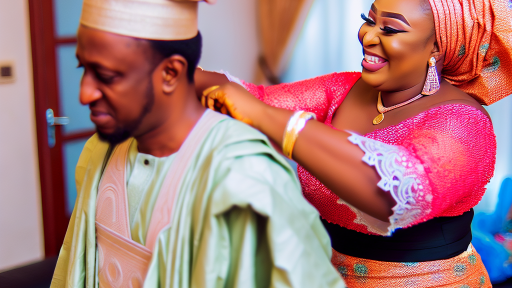Introduction
Strong marriages hold significant importance in Nigerian culture as the foundation for a long-lasting marriage
They create a sense of unity and support within families.
Marriage symbolizes commitment, love, and family values in Nigerian society.
A solid marital relationship fosters stability and encourages collective growth.
However, many couples face various challenges in their relationships.
These challenges include communication breakdown, financial stress, and cultural expectations.
Societal pressures often complicate existing marital issues.
As a result, couples may struggle to maintain harmony in their marriages.
The purpose of this article is to offer insights and advice for building lasting marriages.
By addressing common challenges, we can provide practical solutions.
Strong foundations are built on effective communication, mutual respect, and shared goals.
Understanding these principles is essential for any couple aiming to strengthen their relationship.
Couples must learn to communicate openly and honestly.
Effective communication fosters understanding and trust.
When partners share their feelings, they create emotional intimacy.
This openness helps resolve conflicts before they escalate.
Additionally, respecting each other’s opinions is crucial.
Couples should approach disagreements with empathy.
Recognizing each partner’s perspective strengthens the relationship.
It enhances collaboration and promotes mutual support.
Setting shared goals is another vital aspect of building a solid foundation.
Couples should discuss their aspirations and dreams.
Working together toward common objectives creates a sense of partnership.
It reinforces commitment while minimizing feelings of isolation.
Lastly, prioritizing quality time together cannot be overstated.
Busy lifestyles often push couples apart.
Scheduling regular date nights or family activities fosters connection.
Spending quality time rejuvenates the relationship, strengthening emotional bonds.
Basically, building solid foundations for lasting marriages in Nigeria involves communication, respect, shared goals, and quality time.
Couples can overcome challenges by focusing on these crucial areas.
Strong marriages contribute to happier families, ultimately benefiting society as a whole.
Understanding Nigerian Marriage Customs and Traditions
Marriage is a significant milestone in Nigerian culture.
Understanding the various customs and practices surrounding marriage is crucial.
This section explores traditional and modern wedding practices, the influence of family and community, and the impact of cultural expectations on marital relationships.
Nigeria has diverse marriage customs, reflecting its rich cultural tapestry.
Each ethnic group has distinct traditions associated with marriage.
These customs shape the way couples celebrate their union.
Traditional weddings differ significantly from modern ones.
Both forms of weddings hold importance, but they serve different purposes.
Overview of Traditional and Modern Wedding Practices
Traditional weddings often emphasize cultural heritage.
In Nigeria, the traditional wedding ceremony involves several key elements:
- Bridal Price: A significant tradition where the groom’s family pays a price to the bride’s family.
- Rituals: Various traditional rituals may involve prayers, sacrifices, and blessings from elders.
- Cultural Attire: The couple usually wears traditional attire representing their ethnic group.
- Family Involvement: Family members play active roles in various aspects of the ceremony.
In contrast, modern weddings adopt a more contemporary approach.
These weddings often blend traditional elements with Western influences.
Here are some features of modern weddings in Nigeria:
- Venue Selection: Modern weddings can take place in a variety of venues, from churches to event centers.
- Attire: Couples often choose Western-style wedding dresses and suits alongside traditional attire.
- Guest List: Modern weddings typically invite friends and extended family beyond immediate relatives.
- Ceremony Styles: Many modern weddings include personalized vows and unity ceremonies.
The blend of traditional and modern elements creates unique ceremonies that reflect the couple’s beliefs and values.
Couples often choose to honor their heritage while embracing contemporary practices.
The Role of Family and Community in Marriage
Family and community play vital roles in Nigerian marriages.
Families not only provide support but also guidance throughout the marriage process.
The importance of family can be illustrated through several key aspects:
- Parental Approval: Gaining the approval of both families is crucial for a successful union.
- Support System: Families offer emotional and financial support during the wedding planning process.
- Conflict Resolution: Family elders often mediate conflicts, drawing on cultural wisdom to resolve disputes.
- Community Participation: Community members contribute to the wedding celebrations by attending and participating in ceremonies.
The involvement of family and community extends beyond the wedding day.
Continuous support from family fosters a sense of belonging.
Couples feel encouraged to work through challenges together.
How Cultural Expectations Shape Marital Relationships
Cultural expectations significantly influence marital relationships in Nigeria.
These expectations vary among different ethnic groups but share common themes.
Understanding these cultural norms is essential for building a strong foundation in marriage:
- Gender Roles: Traditional gender roles often dictate the responsibilities of husbands and wives.
- Childbearing: There is a strong emphasis on having children, which is seen as a sign of a successful marriage.
- Extended Family Dynamics: Couples often navigate relationships with in-laws, balancing loyalty and independence.
- Community Expectations: Couples may feel pressure to conform to community ideals regarding marriage and family.
Cultural expectations can create both opportunities and challenges.
While they provide a framework for stability, they can also lead to conflicts.
Open communication helps couples navigate these expectations effectively.
Navigating Traditions and Modernity
As Nigerian society evolves, couples often find themselves balancing traditional customs with modern values.
This dynamic interplay requires flexibility and understanding.
Couples should consider the following strategies:
- Open Dialogue: Both partners should communicate their preferences and expectations candidly.
- Respect for Heritage: Honoring cultural traditions can strengthen family bonds.
- Adapting Modern Practices: Integrating modern elements can enhance the wedding experience and reflect personal beliefs.
- Compromise: Finding common ground is essential in merging differing views on marriage.
Ultimately, successful marriages in Nigeria stem from a deep understanding of both traditional and modern practices.
Couples who embrace their cultural heritage while adapting to contemporary values foster meaningful relationships.
The journey toward building a solid foundation for long-lasting marriages in Nigeria starts with understanding marriage customs and traditions.
Navigating the complexities of family involvement and cultural expectations lays the groundwork for a healthy relationship.
Couples who honor their heritage while adapting to modern realities will create sustainable and fulfilling partnerships.
Acknowledging the past and embracing the future will lead to rich, meaningful lives together.
Effective Communication as the Cornerstone of Marriage
Effective communication forms the backbone of any successful marriage.
In Nigeria, where marriages often reflect cultural values and societal expectations, open dialogue becomes even more essential.
Couples must prioritize honest conversations to build lasting connections.
This section highlights the importance of open communication, techniques for improvement, and ways to address conflicts constructively.
Importance of Open and Honest Dialogue
Open and honest dialogue serves as the foundation for trust and intimacy.
It empowers partners to express their feelings and thoughts without fear.
Here are several reasons why communication is vital:
- Builds Trust: When partners share their thoughts, they cultivate a sense of safety.
- Enhances Understanding: Honest dialogue allows couples to understand each other’s viewpoints.
- Reduces Misunderstandings: Clear communication helps prevent assumptions and confusion.
- Strengthens Emotional Connection: Sharing feelings deepens the emotional bond between partners.
- Facilitates Conflict Resolution: Open discussions enable couples to address issues early.
In the Nigerian context, traditional values sometimes impose barriers to free communication.
Couples may feel pressured to conform to gender roles.
However, embracing dialogue can transform marriages into equitable partnerships.
Couples should strive to foster an environment where both partners feel heard and respected.
Techniques for Improving Communication Between Partners
Improving communication requires intentional effort and practice.
Here are some effective techniques that couples can adopt:
- Active Listening: Listen attentively without interrupting.
Show empathy by acknowledging feelings. - Use “I” Statements: Express feelings using “I” statements to avoid sounding accusatory.
- Schedule Regular Check-ins: Set aside time each week to discuss feelings and concerns.
- Stay Calm and Composed: Approach conversations with a calm demeanor to avoid escalating tensions.
- Seek Clarification: If unsure about a message, ask clarifying questions instead of making assumptions.
- Express Appreciation: Acknowledge and express gratitude for their efforts and contributions.
- Be Open to Feedback: Encourage constructive feedback from each other for growth.
By integrating these techniques into daily interactions, couples can enhance their connection significantly.
Practicing active listening establishes a safe space for both partners, fostering deeper understanding.
Addressing Conflicts Constructively
Conflicts are inevitable in any marriage.
The key lies not in avoiding conflict but in addressing it constructively.
Here are strategies for resolving disputes:
- Stay Focused on the Issue: Discuss the specific problem without bringing up past grievances.
- Choose the Right Time: Find a calm moment to discuss sensitive issues rather than during heated moments.
- Avoid Personal Attacks: Stick to the issue at hand and refrain from insulting or belittling each other.
- Establish Ground Rules: Agree on rules for discussions, such as no yelling or name-calling.
- Take Breaks if Necessary: Allow time to cool off if emotions run high. Return to the discussion later.
- Seek to Compromise: Find middle ground solutions that satisfy both partners’ needs.
- Involve a Mediator: Seek help from a trusted friend or counselor if conflicts persist.
Constructive conflict resolution strengthens a marriage.
It teaches couples to navigate challenges together, reinforcing their bond.
Furthermore, having tools to handle conflict encourages a sense of unity during tough times.
Open, honest communication establishes a strong foundation for successful marriages.
Couples who practice effective communication techniques can understand and support each other better.
Similarly, addressing conflicts in a constructive manner contributes to long-term stability in relationships.
Nigerian couples can build and maintain solid marriages by integrating these skills into their daily lives.
The journey of effective communication is continuous.
Couples must commit to growing together as they navigate the complexities of marriage.
When partners invest time and effort into their communication, they pave the way for a lasting and loving relationship.
Ultimately, the commitment to understanding and supporting each other fosters long-lasting marriages in Nigeria.
Read: Building a Strong Foundation of Trust in Nigerian Marriages
Building Trust and Respect in Relationships
Trust and respect form the bedrock of a solid marriage.
Without these essential elements, a relationship faces immense struggle.
In Nigeria, where cultural expectations shape marriages, understanding these concepts becomes vital.
Let’s delve into defining trust and respect in the context of marriage, explore strategies for fostering trust, and examine how respect significantly impacts marital satisfaction.
Defining Trust and Respect in the Context of Marriage
Trust in a marriage means having confidence in your partner’s intentions and actions.
Couples rely on each other to be honest and supportive.
This foundation allows partners to feel secure, fostering deeper emotional connections.
Trust applies to various aspects of life, including financial matters, emotional support, and even physical safety.
Respect, on the other hand, refers to recognizing and valuing each other’s individuality and choices.
It means appreciating differences and honoring each other’s thoughts and feelings.
In a respectful marriage, partners listen actively, communicate openly, and acknowledge each other’s perspectives.
These qualities create a climate of acceptance and love.
Strategies for Fostering Trust Over Time
Building trust requires ongoing commitment and effort.
Here are effective strategies to cultivate trust in your marriage:
- Open Communication: Ensure that both partners express their thoughts and feelings honestly.
Create a safe environment for sharing concerns. - Keep Promises: Follow through on commitments.
When you promise something, strive to deliver on it. - Practice Transparency: Share your thoughts about finances, family, and personal goals.
Openness helps eliminate misunderstandings. - Be Vulnerable: Showing your true self fosters an environment where your partner can feel safe to do the same.
- Resolve Conflicts Calmly: Approach disagreements with a calm attitude.
Focus on resolving issues rather than winning arguments. - Forgive and Move On: When mistakes happen, address them without holding grudges.
Show your partner that you value the relationship above all.
These strategies build a strong trust foundation over time.
Trust does not develop overnight; it takes effort and care.
Partners should view trust-building as a shared journey toward mutual understanding.
The Impact of Respect on Marital Satisfaction
The importance of respect in marriage cannot be overstated.
Couples who treat each other with respect experience higher satisfaction levels.
Below are the noteworthy impacts respect has on marital happiness:
- Improved Communication: Couples who respect each other are more likely to share openly.
This leads to fewer misunderstandings and conflicts. - Emotional Support: Respectful partners offer emotional support during tough times.
This makes both partners feel valued and understood. - Stronger Connection: Respect fosters a deeper bond.
A respectful relationship feels nurturing and fulfilling and builds intimacy. - Conflict Resolution: Respect can lead to healthier arguments.
Partners are more likely to find common ground when they treat each other with dignity. - Increased Commitment: Couples who respect each other are often more committed to making the relationship work.
This sense of loyalty enhances marital longevity. - Healthier Family Dynamics: In marriages based on respect, children observe healthy interactions.
They learn the importance of treating others well.
Respect significantly influences overall marital satisfaction.
When both partners feel valued, they are more likely to invest their hearts and energies into creating a lasting relationship.
Trust and respect are crucial ingredients for a successful marriage.
Understanding and implementing strategies to build these qualities can enhance marital satisfaction.
Foster trust through communication, transparency, and commitment.
Respect your partner’s feelings and viewpoints and navigate conflicts with dignity.
Together, these practices lay a solid foundation for long-lasting marriages in Nigeria.
Ultimately, both partners must actively participate in nurturing trust and respect.
This journey enhances not only their union but also enriches their lives.
As couples focus on these core values, they embark on the path to enduring love and fulfillment.
Read: Key Foundations for a Successful Marriage in Nigeria

Financial Management in Marriage
In any marriage, money plays a pivotal role. It can be a source of unity or a cause for contention.
In Nigeria, financial management takes on additional dimensions due to cultural expectations and economic challenges.
Therefore, discussing this aspect openly fosters understanding and harmony.
Significance of Discussing Finances as a Couple
Communication about finances is essential in any marriage.
Here are some key reasons why couples should have financial conversations:
- Building Trust: Open discussions foster trust.
Couples feel secure when they share financial information openly. - Clarifying Roles: Understanding each partner’s financial role enhances teamwork.
It eliminates confusion about who handles what. - Setting Goals: Discussing finances allows couples to set shared financial goals.
This mutual vision fosters collaboration. - Avoiding Conflict: Ignoring financial issues often leads to misunderstandings.
Open conversations help avoid potential disputes. - Promoting Accountability: When couples share financial responsibilities, they hold each other accountable.
This accountability leads to better financial behavior.
Budgeting, Saving, and Financial Planning Together
Creating a financial plan as a couple is critical.
A comprehensive approach strengthens the marriage’s foundation.
Here are the steps couples should consider:
- Evaluate Current Financial Status: Both partners should assess personal and joint financial situations.
Understanding existing debts and savings is essential. - Create a Joint Budget: Together, couples should develop a budget that includes both incomes and expenses.
This budget should reflect lifestyle choices and financial goals. - Set Saving Goals: Couples must prioritize saving for emergencies and future investments.
Setting specific savings goals encourages commitment. - Review Periodically: Regularly reviewing the budget keeps both partners aligned.
It helps to adjust any missteps and celebrate successes. - Explore Investment Opportunities: Couples should research and discuss investment options.
Investing together can enhance emotional and financial stability.
Navigating Financial Disagreements and Expectations
Financial disagreements are common in marriages.
Dealing with these issues constructively can strengthen the relationship.
Here are strategies for navigating disagreements:
- Establish Open Communication: Encourage honesty and transparency.
Discuss feelings about spending and saving openly. - Listen Actively: When disagreements arise, listen to each other’s perspectives.
Understanding different viewpoints helps find common ground. - Stay Focused on Goals: Remember shared financial goals during discussions.
This focus helps to steer conversations positively. - Accept Compromise: Be ready to make concessions when needed.
Compromise shows respect for each partner’s desires. - Seek External Help: If discussions continuously lead to conflict, seeking professional help can be beneficial.
A financial advisor or counselor provides valuable advice.
Ultimately, managing finances in a marriage requires teamwork.
Couples that collaborate and communicate effectively create a strong financial foundation.
This foundation not only enhances their economic situation but also strengthens the marital bond.
In Nigeria, where the economy can present challenges, effective financial management becomes even more critical.
Couples must equip themselves with the tools and knowledge to handle these challenges together.
By discussing finances openly, budgeting wisely, and navigating disagreements thoughtfully, couples can build lasting and fulfilling marriages.
Whether navigating the complexities of Nigerian culture or addressing financial changes, unity in financial matters is fundamental to marital success.
Read: How Nigerian Marriages Shape Family Dynamics in 2024
Balancing Personal Aspirations with Marital Responsibilities
In a marriage, each partner’s personal aspirations play a crucial role.
Individual growth enhances the relationship, creating a healthy environment for both partners.
A solid foundation involves recognizing and supporting each other’s dreams and goals.
It fosters a mutual respect that is fundamental for long-lasting marriages.
The Importance of Individual Growth in a Relationship
Individual growth contributes significantly to a successful marriage.
When partners pursue personal aspirations, they bring more to the relationship.
This growth enhances self-esteem and overall happiness.
Thus, each person’s fulfillment positively influences the marriage.
- Improved Communication: Individuals who grow learn to express their needs better.
This leads to open dialogue and reduced misunderstandings. - Increased Respect: When one partner achieves a goal, it boosts both partners’ respect for each other.
This fosters admiration and support. - Greater Resilience: Partners who grow individually develop coping skills.
This resilience can help manage marital challenges more effectively. - Personal Fulfillment: Each person feeling fulfilled helps decrease dependency on their spouse for happiness.
This creates a balanced dynamic. - Enhanced Emotional Connection: Shared experiences of personal growth can deepen the emotional bond between partners.
This encourages shared learning.
Strategies for Supporting Each Other’s Goals
Supporting each other’s goals requires intentional efforts from both partners.
Commitment and encouragement help manifest shared dreams and individual aspirations alike.
- Open Dialogue: Regularly discuss goals and dreams.
Ensure both partners feel comfortable sharing aspirations. - Set Shared Goals: In addition to individual aspirations, create shared goals.
This builds unity while allowing personal pursuits. - Celebrate Milestones: Acknowledge and celebrate achievements together.
This reinforces support and encourages further endeavors. - Allocate Time: Schedule time dedicated to pursuing personal goals.
Ensure that both partners respect and honor this commitment. - Provide Constructive Feedback: Be open to offering helpful suggestions.
Encourage honest and respectful discussions about progress. - Attend Events: Go to events together that relate to each partner’s interests.
This shows investment in each other’s aspirations. - Balance Responsibilities: Share household responsibilities to free up time for pursuing goals.
A joint effort ensures personal time.
Maintaining a Balance Between Personal Space and Togetherness
Finding a balance between personal space and togetherness is essential for a thriving marriage.
Both partners should enjoy sufficient independence to nurture personal growth while fostering their connection.
- Schedule Quality Time: Set aside time to spend together regularly.
This strengthens the bond and ensures shared experiences. - Encourage Individual Interests: Allow each partner to pursue hobbies or interests alone.
This promotes personal growth and fulfillment. - Create a Shared Calendar: Use a calendar to manage both personal and shared activities.
Staying organized prevents overlapping schedules. - Establish Boundaries: Communicate personal boundaries effectively.
Ensure that each partner feels comfortable expressing their needs. - Practice Self-Care: Each partner should prioritize their physical and mental health independently.
Self-care enhances overall well-being. - Engage in Mutual Activities: Participate in activities that both partners enjoy.
This encourages bonding while allowing room for personal growth. - Reflect Regularly: Take time to reflect on the balance between your lives.
Discuss what is working and what needs adjustment.
Balancing personal aspirations with marital responsibilities is an ongoing journey.
Couples should remain committed to fostering both individual and shared growth within their relationship.
Open communication remains key to navigating this balance.
With intentional strategies and mutual support, both partners can thrive.
Embracing personal goals does not diminish the relationship.
Instead, it strengthens the marital bond and enhances the overall partnership.
Ultimately, balance leads to a lasting marriage in Nigeria.
Partners embracing their individuality while nurturing their union enables a solid foundation.
With love, respect, and dedication, couples can cultivate a thriving marital partnership.
Read: Key Foundations for a Successful Marriage in Nigeria
The Role of Faith and Spirituality in Strengthening Bonds
Faith and spirituality serve as critical pillars in nurturing enduring marriages.
In Nigeria, diverse religious practices shape marital expectations.
Religious perspectives on marriage offer unique insights and guidance.
Different Religious Perspectives on Marriage
Nigeria is home to a multitude of religions, including Christianity, Islam, and indigenous beliefs.
Each religion has its unique interpretation of marriage:
- Christianity: Many Christians view marriage as a sacred covenant.
This union reflects the relationship between Christ and the Church.
Couples are encouraged to seek guidance through prayer and scripture. - Islam: In Islam, marriage is considered a solemn contract.
It comes with mutual rights and responsibilities.
The Quran offers guidelines that promote love and understanding between spouses. - Indigenous Beliefs: Many Nigerian communities hold traditional beliefs that shape marriage.
These often emphasize ancestral blessings and communal support.
Couples participate in rituals that solidify their bond with their families and communities.
Understanding these perspectives helps couples navigate challenges.
Religious practices can instill shared values, further binding partners together.
The Impact of Shared Beliefs on Relationship Stability
Shared beliefs contribute significantly to marital stability.
When partners possess common faith, they often experience:
- Stronger Commitment: Similar religious beliefs reinforce dedication to the relationship.
Couples work together towards shared goals, enhancing their bond. - Emotional Support: Spirituality provides a network for emotional assistance.
Couples who pray or participate in religious activities together feel more connected. - Conflict Resolution: Shared faith often guides how couples resolve disputes.
They lean on their spiritual teachings, fostering understanding and forgiveness.
A strong spiritual foundation often leads to healthier communication.
Partners feel secure in expressing their feelings and concerns.
This openness allows them to grow together, rather than apart.
Engaging in Spiritual Practices Together
Participating in spiritual practices enhances marital bonds.
Couples can explore various activities, including:
- Prayer: Regularly praying together creates a strong spiritual connection.
It fosters openness and trust between partners. - Worship Services: Attending religious services strengthens communal ties.
Couples often meet other like-minded individuals, enriching their social networks. - Rituals and Celebrations: Engaging in cultural or religious rituals reinforces family values.
Celebrations of faith create lasting memories and shared experiences. - Volunteering and Service: Serving the community together nurtures compassion and teamwork.
This shared purpose bolsters mutual respect and admiration.
Incorporating these spiritual practices into daily life leads to a deeper connection.
Couples find joy and strength in their spiritual journey together.
Balancing Individual and Shared Spiritual Beliefs
While shared beliefs offer significant advantages, individual faith should also be respected.
Each partner may hold personal spiritual views that enrich the relationship.
To maintain harmony, couples should consider:
- Open Communication: Discussing individual beliefs fosters understanding.
Couples can explore how these beliefs complement one another. - Encouragement of Personal Growth: Supporting each other’s spiritual growth encourages personal fulfillment.
This respect enhances the overall relationship. - Creating a Shared Spiritual Space: Establishing a space for both partners allows for individual practices.
This space nurtures connection while respecting individuality.
Finding a balance between shared and individual spirituality enriches the marital experience.
Couples learn from each other while deepening their bond.
The Benefits of Spiritual Counseling
Seeking spiritual counseling can be beneficial for couples facing challenges.
Counselors often provide valuable perspectives that align with couples’ beliefs.
Benefits include:
- Guidance through Difficult Times: Spiritual counselors often help couples navigate hardships.
Their insights can illuminate the path forward. - Strengthening Communication Skills: Counselors teach effective communication techniques.
Couples become adept at discussing even the toughest issues. - Reinforcing Commitment: Understanding the spiritual dimensions of marriage can reignite commitment.
Couples are reminded of their vows and shared purpose.
Engaging in spiritual counseling helps couples maintain strong, fulfilling marriages.
It provides the tools needed to weather life’s storms together.
Faith and spirituality play a vital role in building strong marriages in Nigeria.
They encourage commitment, emotional support, and effective conflict resolution.
Engaging in spiritual practices together fosters deeper connections.
Respecting individual beliefs enhances the shared journey.
By investing in their spiritual lives, couples can create lasting bonds.
The journey of marriage becomes richer and more fulfilling.
As they navigate life’s challenges together, their love and faith will continue to grow.
Seeking Professional Help When Needed
Building a solid foundation for long-lasting marriages in Nigeria requires commitment and effort.
Couples often face challenges that test their unity and love.
Recognizing when to seek professional help can be crucial in maintaining a healthy relationship.
Understanding the value of counseling and workshops is essential for couples encountering difficulties.
Understanding the Value of Counseling and Workshops
Counseling provides couples with an opportunity to address their issues in a safe environment.
It helps them explore their feelings, thoughts, and behaviors.
Here are some key benefits of seeking professional help:
- Safe Space: Counseling offers a neutral ground where couples can express their feelings.
- Objective Perspective: Professionals can offer insights that couples might overlook.
- Improved Communication: Workshops can teach effective communication tools essential for healthy relationships.
- Conflict Resolution: Professionals can guide couples through resolving their disputes constructively.
- Strengthened Bonds: Participating in counseling and workshops can deepen emotional connections.
- Personal Growth: Couples can learn more about themselves and their partner through guided sessions.
In Nigeria, cultural beliefs can sometimes deter couples from seeking help.
However, recognizing that everyone faces challenges can enhance understanding.
Seeking counseling should not be viewed as a sign of weakness but rather as a proactive step toward growth.
Signs That a Couple May Need External Assistance
Many couples may not realize when they need professional assistance.
Recognizing these signs early can prevent further complications.
Here are several indicators that suggest a couple may benefit from external support:
- Frequent Arguments: If couples argue regularly without resolving conflicts, seeking help can provide strategies for effective communication.
- Emotional Disconnect: A growing distance between partners, marked by reduced intimacy or affection, is a warning sign.
- Unaddressed Resentments: If past grievances linger and are not openly discussed, professional guidance may be necessary.
- Lack of Trust: Issues around trust can erode relationships.
Couples experiencing trust issues should seek help. - Changes in Behavior: Significant changes in one partner’s behavior or mood may signal underlying issues that need addressing.
- Life Transitions: Major life events like parenthood or job changes can strain relationships; counseling can help navigate these adjustments.
Identifying these signs early is key.
Couples should not hesitate to seek support whenever they feel overwhelmed by their challenges.
How to Choose the Right Professional Support
Selecting the right professional can significantly impact the counseling experience.
Here are important factors to consider when choosing a counselor or workshop:
- Qualifications: Ensure the professional holds the necessary credentials and training in marriage or couples therapy.
- Experience: Consider their experience, especially with couples facing similar issues.
- Specialty: Some counselors specialize in specific areas, such as communication or conflict resolution.
Choose one aligned with your needs. - Approach: Different professionals use various therapeutic approaches, such as cognitive-behavioral or emotion-focused therapy.
Understand their methods before committing. - Compatibility: A good rapport with the counselor is essential.
A comfortable environment encourages open sharing. - Reviews and Recommendations: Seek testimonials or recommendations from other couples who have attended sessions.
After considering these factors, couples should schedule an initial meeting.
This meeting will help them assess comfort levels and approach to therapy.
Open communication about expectations and goals is crucial during the first session.
In a nutshell, seeking professional help can greatly enhance marriages in Nigeria.
Couples should approach counseling and workshops with an open mind and willingness to grow together.
Understanding the value of these resources, recognizing signs that indicate the need for help, and carefully selecting the right professional fosters a healthier relationship.
Building a long-lasting marriage is an evolving journey, requiring effort and dedication.
With the right support, couples can cultivate a thriving partnership grounded in love and understanding, ensuring a solid foundation for the years to come.
Conclusion
We examined essential elements for lasting marriages in Nigeria.
Communication remains crucial, enabling couples to express their feelings and resolve conflicts.
Trust serves as the bedrock for any relationship, fostering a sense of security and loyalty.
Moreover, respect plays a significant role in ensuring both partners feel valued.
Nurturing emotional and physical intimacy strengthens bonds, while shared values help align goals and dreams.
Financial management deserves attention, as it often influences marital satisfaction.
We encourage couples to prioritize their relationships actively.
Invest time in one another and practice patience, especially during challenging times.
Be open to change and growth, as life continuously evolves.
Each couple’s journey is unique, filled with joys and challenges.
Remember that building a solid marital foundation takes effort and commitment.
Seek support from community resources, such as counseling or family advice, when necessary.
Never underestimate the power of love and companionship.
The rewards of a strong, lasting marriage are immeasurable.
Embrace every moment of the journey and cherish your partner deeply.
In Nigerian culture, we often draw wisdom from our elders.
Their experiences can guide us in navigating marital challenges.
Take these lessons to heart and apply them to your relationship.
Ultimately, commitment to your partner will pave the way for a fulfilling partnership.
Continue to learn and grow together, seeking joy and fulfillment in shared experiences.




